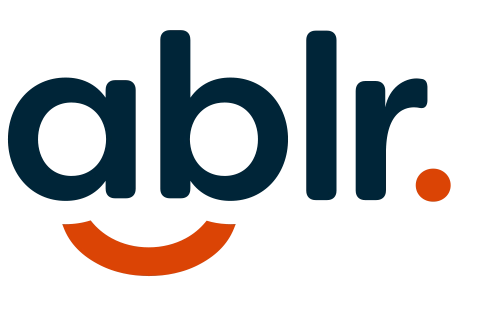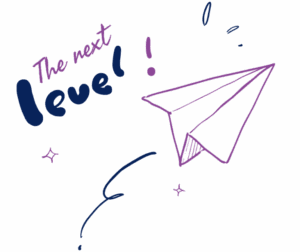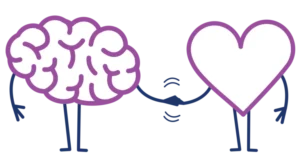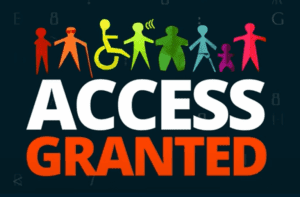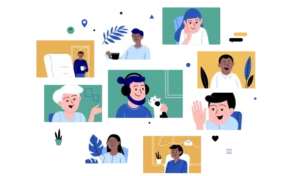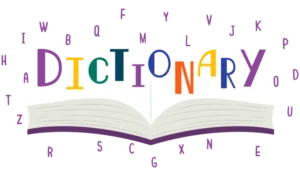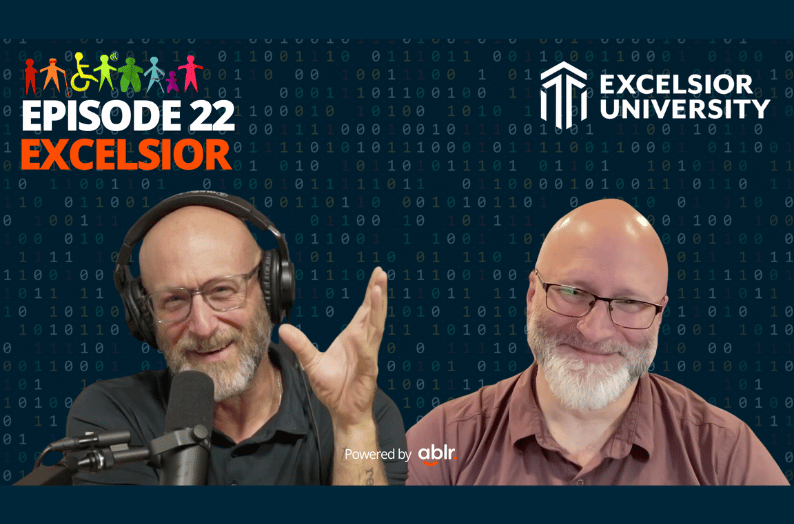Access Granted: Excelsior Transcript. Tune in wherever you listen to podcasts
Mike: Welcome to Access Granted. I’m your host, Mike Iannelli. And today we’re talking with Mark Oppenneer, Senior Director of Web Systems at Excelsior University, about digital accessibility in the higher education space. We’ll explore how Excelsior ensures its online platforms are accessible to all students, their partnership with Ablr and the challenges they’ve overcome in creating a more inclusive digital environment. We’ll also dive into their strategies for improving user experience and collaborating with departments to prioritize accessibility. Stay tuned for valuable insights on the future of digital accessibility and inclusion in education.
The whole intention of this podcast really has always been from day one is to really elevate our clients, right? Because ultimately, especially when you all, you and I started working together with Ablr, you guys were ahead of the curve.
I’ve always felt that way. I mean, we’ve talked about it before you were thinking accessibility when we even started talking. And so we’ve been together for almost three years now.
Mark: Three years, yeah.
Mike: Three years, three years. For three years, and you guys have been ahead of the curve from day one. So welcome to the show. Welcome to Access Granted. Why don’t you introduce yourself, tell us a little bit about your background, tell us about what you’ve been doing there, and give us a little bit of background in terms of what makes Excelsior University really unique. Because again, you guys are leading the way.
Mark: My name is Mark Oppenneer. I identify as a bread baker and as a musician and as an army veteran as a sometimes stained-glass-window-maker. But I make my pennies working as the Senior Director of Web Systems at Excelsior University. I’ve been here for 12 years.
Mike: 12 years. Wow.
Mark: Yeah.
Mike: Hope you got a good pension, my friend.
Mark: Almost a teenager.
Mike: So tell me about Excelsior and really what makes what you do there unique.
Mark: The institution’s been around for 53 years. And if you do the calendar math, that doesn’t make any sense because we’re an online university. So when it started, it was called Regents College. It was meant to be a credit aggregator and degree completion outfit.
And we used to be part of the State University of New York system. So we got our own charter as a private institution. And that’s when Excelsior College was actually born. Just two years ago, we became Excelsior University, but our focus is on adult learners. So the average age of our learners about 40 years old.
So that’s one thing that kind of makes us unique, but also who our students are. So we’ve got about 30 percent of our students are active duty military. About 15 percent are veterans.
Mike: I didn’t realize that the military background was so strong at Excelsior, which I love that, right? Cause again you’re bringing in individuals that have a desire and are motivated to make a life change for themselves for the better, which I think is incredible.
And again, that’s interesting with accessibility because when you talk about like digital products, like some of the product, I know the website is one of the components, but obviously being a purely online university—what are some of the products when you talk about accessibility that you’re really focusing on right now to make sure that all people have access across the board?
Mark: Let me start with pre-Ablr history. We got sued. Excelsior got sued. And the lawsuit was one of eight identical lawsuits put out on the same day. And the other seven were all higher ed institutions. And show me a higher ed institution that wants to litigate. It’s cheaper to settle and so that’s what they bank on.
And after that, my boss said, “what are we going to do to avoid this in the future?” And I said, we actually don’t have recourse. We can get sued tomorrow. Any higher ed institution can get sued day after day after day. Because there’s not a law that says now that we’re doing accessibility, nobody can bother you.
So one thing that I realized early on is: we need an accessibility partner, somebody who can audit us, point us in the right direction, support us through the journey of becoming more accessible. And so when we started working with Ablr, it met, it checked all those boxes. It has always been a concern, but it’s really become a passion within the last three years.
Mike: Yeah. And you’ve showed that, you have made a real commitment to this. And from day one you’ve really been an advocate. So how do you help ensure like, obviously Ablr has been a huge partner with you all, and we’ve been working together for a bit, but at the end of the day, you still have to go back to work and do this, you’re doing the work. You’re putting in the time.
What are some of the best practices that you’re using to ensure that the platforms are accessible? Take me through a little bit of that if you could.
Mark: One part of this, and this is a major shift, is we’ve got—my team has, there are four of us, and one is a marketing web developer embedded in marketing—and he is making sure that accessibility is part of the project workflow.
That when they set up their template and they’re saying, okay, we got a brand new project that the first question they’re going to ask is, “how do we ensure that this is accessible to everyone who uses it?”
Mike: You guys have taken this and rolled this into a best practice. So in everything that you’re doing from a digital products perspective goes through a standard. And so it’s not like an afterthought it’s built into your processes.
Mark: We’re still working on that. I mean, part of that is sort of like institutional change management, institutional awareness, so that we’ve got the top level of leadership all the way down and the bottom all the way up. They’re aware of accessibility. They understand its importance and why we want to do it. And as an institution that serves adult learners, we talk about accessibility and we think generally, I think, “oh, blind people.” No.
Mike: Yeah.
Mark: It’s people who are losing their vision. Like us, you know,
Mike: I can’t even see you from here.
Mark: Single parents trying to wrangle a family, a job and get an education. So accessibility really is part of our mission. A couple of years ago we launched the Center for Social Justice and Daniel Pascoe Aguilar is the founding director and he’s our Chief Diversity Officer, has really come to see accessibility as a social justice issue. So that has really helped to bring things together.
Now on a day to day basis, we’re using the Pope scan. So one thing that, that Ablr brought to us is these audits, which lay out a clear path for remediation. We can assign ourselves tasks and we can do these things daily. The marketing web developer, he did the entire online writing lab audit and remediation.
And I’m so proud. He took 129,300 total errors, and in four months, 647.
Mike: That’s amazing. How many were done globally through the CMS? I just want to know, are these all independent violations?
Mark: No, no, no. Plenty of them are templated.
Mike: And yeah, but at the end of the day, you guys made the commitment. You’ve been working on it. You’re still working on it. And so one of the things we find is that the top down is critical, right? I mean, in having buy-in from, and I hate saying the top down, but the reality is you have to have buy-in from the organization because a lot of times some of these things aren’t budgeted. Some of the things don’t have resources. There’s other things that are more important, but in, in this perspective, when you have an organization that says, “Wait a minute, we believe in this. This is something that matters for all people. We’re going to support this.” And you guys have made a pretty good commitment to this. And we’ve been aligned for three years now. And I’m guessing that’s kind of when this all started, right? 2021. So, is it safe to say that kind of the lawsuit shed a lot of insight into sort of what you were missing, why you were missing it, and then drove you to make a decision to engage with an organization?
Mark: Well, since we had been already trying to adhere to the Section 508 guidelines, I mean, it didn’t really come as a surprise because we knew it. It was kind of all over the higher ed media, like, “look out, you’re going to get sued.” And so when it came, it’s like, are you serious? We are compared to Phoenix and Western Governors and SNHU, like Excelsior University is a fairly mid-sized organization.
I don’t think we’re a target, I guess is what I’m saying. So it was the swift kick in the behind that we needed to supercharge our efforts into accessibility. One of the issues, big issues at the beginning was resource allocation. So at that point, we were a team of two web developers serving all of these properties.
And we’re able to do that not only because of our extreme skill and uh, no, but we’re able to do it because we use really great tools. So we’ve gotten rid of a bunch of large platforms and we’ve replaced everything with free and open source. And we use WordPress. It’s an enterprise platform at this point.
Mike: Was that what drove the shift is that you had the control internally to make those modifications and enhancements?
Mark: No, I actually had to fight for it. I’m, I’ve just always been an advocate for free and open source. I know that there are always the exec, executive concerns about, “well security and you could get hacked.” And that’s why we have an incredible infrastructure and security team. But we chose to do it also because we’re a unique organization with unique needs, and if we need something built, we have an applications development team. We have an H5P library. So there are other things now that we’re starting to bring our hands around.
Here’s a good example of a bespoke tool. It’s a KPI dashboard. The Pope scans go in. I’m able to see a month by month view. And recently, we saw a spike and then it came back down.
Mike: Inspecting what? Violations?
Mark: Yeah errors. And what we were able to do is tie that to the release of new program pages. And so we immediately identified it and took care of the issues, and that came right back down.
Mike: University systems, in my opinion, professionally, are lacking significantly behind the curve in terms of fully universal experiences.
Mark: Right.
Mike: And the inclusion portion it’s just missing, right? It’s like, oh well we have some things. But like if you’re a student, ultimately how are you gonna get there? Talk about these products and how you’re helping sort of transition this, the whole ecosystem.
Mark: I had mentioned that we used to be a team of two, and earlier this year we became a team of four. We’ve got one developer who works in marketing, and he’s embedded there. And he takes care of them. He is their web developer. And another one of them is embedded in the instructional development and design team, so the academic side of the house. And he is a Senior Academic Web Applications Developer, and he comes with an incredible talent. He brings open source projects that he’s created from the ground up that are all accessibility-first products. So we’ve got a team now that’s focused on accessibility. My other partner, he is developing the new student portal. And the first thing he’s doing is meeting with Kim, your Accessibility Director, to discuss: “where do we start?” Before the project has even been planned, what do we need to be doing? And that’s one of the keys.
You asked about other institutions. Stop thinking about accessibility as a burden and treat it as an opportunity. Because if everybody can access your materials, your resources, your activities, that becomes a distinguishing characteristic. So some of the products you had mentioned, the public website, clearly, we have the online writing lab and online reading comprehension lab.
We converted it to WordPress, brought it to that open source and rebuilt it. There are the faculty, staff, and student portals. Those are important because in some ways they’re wrap arounds. So we have a faculty system, right? But what they don’t have is a blog, is a calendar, a collection of resources that really speak to different departments or whatever.
And so we build these environments that essentially complement the sort of out-of-the-box products. So we have a student information system that offers students the ability to do the interactive stuff: paying for bills,
Mike: checking your grades.
Mark: Yeah,
Mike: That’s where they live, right? Ultimately communicate with professors, they check their grades, they pay their invoices. But that, now that piece is often forgotten, right? Cause it’s the credentialed experiences, but not for you though.
Mark: No, no, no, no. Actually.
Mike: Let’s point.
Mark: Wait a second though, those self-service applications, they’re developed by our applications development team.
And our SIS is 35 years old, hand-built from the ground up. And they are fighting the lasagna, like year after year of change and change. I’ve gone to them and I’m like, “can’t you just change this one little thing”? And they’re like, “no, we have to work cautiously because so many things are interconnected.”
Mike: This is a commitment. This is a commitment. This isn’t like, let me just get it fixed, get to the ADA, mitigate my risk, make sure I’m compliant. It’s not about that. And there’s a different view of, oh, let’s just not, “let’s protect ourselves” versus “let’s make sure our students have the access and usability that they need.” And that to me is like the biggest takeaway. This is not something that we just do because we feel like we have to, or we’re going to get litigation. This is about, let’s make a commitment. Maybe litigation is the thing that sort of spikes that movement.
Mark: I was just about to say that, but yeah, if you’re talking to the highest levels of leadership, you’re not going to go in and talk about color contrast. You’re going to go in and “this is how it’s impacting our bottom line.” It becomes a reputational risk. Absolutely. It becomes a risk of students not receiving the quality education that we have so we have worked hard to prepare for them. The dropout rates will increase. There’s just so many of these factors that you actually don’t really need to talk about the day to day accessibility work at the higher levels, and I hate to make accessibility a bottom-line issue or a legal issue, but I think that’s the language that, it’s the executive.
Mike: That’s a sad reality. We have that conversation every day. Which leads me to my next thought is, what’s your memory of our first few conversations and getting introduced to Ablr? And then I want to talk a little bit about Kim and this importance of manual testing, because that really is the differentiator.
Mark: The first time we met, I think.
Mike: Keep it nice too, man. I mean,
Mark: First thing I saw was a guy who was trying to cop my style. I mean…
Mike: I mean, I don’t know, but I think I’ve exceeded your style, bro.
Mark: Oh, dang. That hurts.
Mike: We are, man. We got be honest with each other.
Mark: But actually this, right there, that just, that kind of banter—that was there from the very beginning. And so you made us feel at ease. And the one thing that was important to me is you weren’t alarmist. You were not coming and going, “what the heck are you guys doing here? Oh my gosh, you’re doing this all wrong. Here’s what you need to do.” It was never that, it was always, “We are your partner. We are here to support you. You get to do the work. You’re going to do the remediation.” And so now that we have a team of four, I feel that we are far better resourced. Literally now we have become the accessibility people at Excelsior and we recently formed the Web Development Center of Excellence.
Thank you. Thank you. One of the pillars of that is accessibility, usability, for everybody. That includes not only the day-to-day, hands-on remediation work, but it also includes doing things like the two-hour introduction to accessibility. And that’s for all staff. And it’s going to be the basic introduction: “What is accessibility?”
And then that second hour is going to be about “How do we do accessibility?” After that, we’re going to have a series of four separate audience-based trainings. So one for our design team, one for content, one for development. It’s a tiered sort of scaffolding kind of thing. Get in, explain it like it’s a new concept, then start looking at how to embrace that and make it part of our behaviors. And then we’ve got actual people writing content, doing things, creating PowerPoints. And I was ashamed of myself briefly because I created the web development center of excellence slide deck. And I was really stoked because accessibility is front and center. The dang thing wasn’t accessible and I had never thought that it wouldn’t be. It just never occurred to me. And so I went through the process of teaching myself how to make a PowerPoint accessible, and it took a lot of time, which was valuable time spent.
Mike: That’s the Holy grail that we’ve always been pushing is that, yes, this is a partnership. We work on this together. We obviously provide the tools, the tech, the testing, the education, all those things. And it’s really the responsibility of the organization to take that information and then to build your own internal infrastructure. We can help obviously help do that. But you’re doing it, man. That’s the whole thing. Like you’re not just taking it and going, oh, I did my thing and I’m moving on. You’re incorporating the best practices throughout the entire organization so it becomes a best practice for everyone. It’s part of the workflow, part of the process, part of how you do business and part of how you educate people.
And that’s exactly what is supposed to be happening. And that’s why Ablr was built. For that intention, and you are delivering on that every single day.
Mark: One of the things that we’re working toward, we’d like to establish a relationship with the student advisory council so that we can solicit engagement. We want to know right away if a student says, “Hey, I’m having a hard time accessing this,” or something like that. So we’ve got like the librarians, they were the ones coming to me and saying “what about accessibility?” It’s really, we’ve got a good organization that’s willing to open its mind to this. [00:18:00] Every single day, we are doing something in the name of accessibility.
Mike: One of the things I want to know is like, what did you learn from the audit? Talk about what you’ve learned by working with Ablr and how we do that. Was it insightful for you?
Mark: Yeah. So the first order of march when we met and we put together the contract and here’s the first leg and here’s the second leg. We knew it was going to be the public website. And when we got delivered the audit, I was scared out of my wits because it was item after item after item of things that need to be addressed. And so initially I treated accessibility as I need to fix this thing, this item. The more I did it, I started to get sort of a holistic feeling about accessibility that, okay, this item is an item here. It’s probably an item everywhere. Let’s go check that. Let’s check that already. So that when you do an audit for the other sites, you’re not going to find that one there. By giving me the audit for one piece of our digital environment, it has instructed us to do that across many things.
That’s powerful because it’s not just like, “yep they did an audit and we fixed it.” Hmm, no. You did an audit and we fixed more than that.
Mike: When you think about other university systems, what are some of the things that they need to be aware of? And again, I will say this not to lead the witness here, but the manual testing side, right? The commitment to policy, the commitment to ongoing procedures, like what should they be aware of? What should they know from what have you learned from working with us?
Mark: It’s an environment. It’s not a thing. So first off, resource it, allocate, hire new people, hire good, qualified people with experience. If you have a web designer who is like, “yeah I took an hour course.” No, no, no. You have to have somebody who’s really embracing it to come in. And so you start to develop champions. Now those champions are going to help you with the institutional change. Then you start looking at, okay, there’s the day to day work. And that’s important and critical. But it’s also important and critical to put yourself into policies and procedures. Share your experiences. Find communities. There are great discussions about accessibility happening all over the place. The WP campus, WordPress and higher ed group, has an accessibility thread. They meet monthly. So it’s a community that you can find other people doing it and you can find out like, how did you get there? How did you do that?
Mike: Another thing I want to just ask you is when these online, because you’re an online university, and a lot of universities are shifting there. They have different dual modalities. And look it’s important, right? Yeah, flexibility is a key, key piece of education today. But when students don’t have access and they can’t get online. What does that do to the demeanor or the internal systems of a human being where they’re just excluded in this environment? Talk about that a little bit.
Mark: Think about the social and emotional impact as a student who, you know, in your heart, that you are not receiving the education that your classmates are. We have a really great learning services unit, and with OER, they’re always making sure that there are different modalities for these open education resources. You should not have to request an accommodation. If you have a book, you need to read it, there should be an audiobook. There should be transcripts for videos.
All this stuff that we hope would make a difference for students. You gotta do that work. I mean, if we don’t have trained faculty to help students through these kinds of situations, that student is gonna go. They’re going to find another place that can support them better.
Mike: So talk about the manual testing piece though, because that, that is one of the key differentiators.
Mark: I didn’t realize how important it was, that in one of the conversations that I had with Kim, at some point I was like, “Gosh, I don’t use assistive technology. I don’t use a screen reader. It would be really good to see it in action.”
So she set up a meeting with one of the people doing the manual reviews. It’s as foreign to me an experience as, it’s like I don’t know.
Mike: Another language. It’s another language. Yeah. It’s like hearing another language for the first time. Very fast.
Mark: And if it’s not accurate, you’re going to lose your place.
Mike: So I got two, two questions for you. Knowing what’s coming around the corner with these new regulations and requirements, what are some of the risks that schools face if they don’t take action on accessibility standards and usability experiences?
Mark: Students who have a poor learning experience because you’ve not taken their needs into account. The impact on the bottom line. Hey, what if you’re, what if you’re losing ten students a year? That’s ten students that you shouldn’t have lost. And if those ten students go and talk to friends, if they get the impression that our institution is not right for them, it can become a reputational thing. And all it takes is a Reddit thread. What the heck is up with it? “What the heck is up with Excelsior? They say they’re accessible, but they’re not.” Like, oh my gosh. How do you repair that? You know, it’s there. I have actually talked to our Risk Management Director and said, “accessibility is a risk issue, and we need to mitigate risk by fully embracing and fulfilling the promise that we actually serve all students.”
One of the mottos was, “we meet students where they are.” Well, that can also mean physically. But it can also mean where they are in their life with whatever experiences they have.
Mike: So the risks are obviously reputational, right? There’s a mitigating risk. There’s a business, financial bottom-line risk.
Mark: Learning outcomes can be impacted.
Mike: And that might just be enough right there. At the end of the day if the university says, “this is what we do, this is why we do it, this is the best way of getting it.” It’s more than like, it’s again, it’s more than a hat. It’s more than saying you graduated from this prestigious university.
Yeah, it’s more than that. And I think just to go back to your risk about the outcomes, think about the inverse of what you were saying. What if you are delivering on accessibility? What if you are delivering on usability? What if you are delivering on universal experiences for all people? They will tell 10 more people, if not 20 more.
And think about the impact of the bottom line over time, where you’re creating those universal experiences for better outcomes for every single human being. And that to me is worth the dime, right? That’s worth every bit of what we’re trying to accomplish here.
Mark: Yeah. Time, energy, and money well spent.
Mike: So when you think about accessibility, like what are some of the future challenges that you can sort of envision? Because you’ve been living and breathing it for a long time.
Mark: Different tools are being born every day. So when we first started our Gen AI task force, we were very focused on the data. And then we started to say, okay, data, but also I did a chat bot for our student portal. And you can ask the student portal questions like “when’s the next course on zombies?” And the language model will say “he probably means the zombie and literature course and the next one is going to be in fall to term.” And so it can tell the student this. Right there, that’s awesome because that’s information you can’t search in the search bar for. It’s a knowledge kind of question, a context question. I’ve also encouraged the task force to look at the academic side of the house. They’ve already, I mean, they’re super smart. They have policies with AI in them, in place for academic work. They were on that even before our task force was created. And I want them to be part of this conversation as well.
Mike: Now, Mark, everything you’ve said today has been fantastic and I can’t thank you enough for not only being here today on the show, but also your passion and conviction towards this, because we need more advocates like this in the EDU space. Not only in EDU right, but in commerce and associations and healthcare and financial institutions, all of it.
And I think we’re part of something right now that’s going to be pretty exciting over the next few years to see how this changes. Again, and it’s not just about the impact of making sure you’re not, you know, the bottom line and getting sued. It’s the impact of these individuals that have been on the sidelines for so long are now getting an opportunity. And look at the potential of what we can create and the brains out there that are going to be now be heard, now be seen, now be in the workforce doing things that are amazing.
We have not had that opportunity. And I think just to think about the talent and the people out there that have been waiting for this opportunity.
Mark: Yeah.
Mike: To me, that’s exciting because it could change everything that we know as corporate America today. It could change everything. And that part I’m excited for.
Mark, I appreciate you being here, my friend. I feel like we, we got to do a couple more of these. Maybe we’ll do one just for shooting the breeze somewhere else, but I appreciate your partnership. I appreciate your friendship. Ablr appreciates everything about you all in Excelsior. We are so grateful you’re a partner. And I just thank you also, thank you for being here, my friend. Thank you.
Mark: Yeah, my pleasure. And honestly, there’s not a word I can say in criticism about Ablr. I mean, the fact that I can say that about a partner. It’s been really awesome. So I thank you and your team
Thank you for saying that. I’m sure they’re going to be excited to hear this as well. But man listen, we are signing off today and I am so grateful for you my friend.
Mike: Thank you for tuning in to Access Granted. A big thanks to Mark Oppenier for joining us and sharing his expertise on digital accessibility in higher education. It’s inspiring to see how Excelsior University is leading the way in creating inclusive online experiences for all students. If you enjoyed this episode, don’t forget to subscribe and share it with others passionate about accessibility and inclusion.
Join us next time as we continue exploring the stories, challenges, and breakthroughs shaping a more inclusive digital world. Until then, I’m Mike Iannelli, and this is Access Granted. See you next year.
